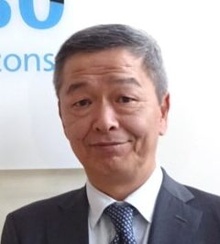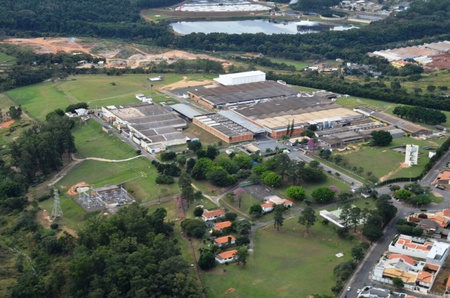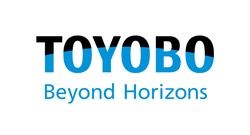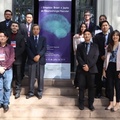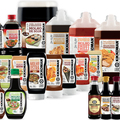In the fifth episode, we spoke with Yasuyoshi Fujii, President of Toyobo Brazil.
In 1953, Japanese immigration to Brazil resumed in earnest. Two years later, in 1955, the company entered the Brazilian textile business. The company has expanded its business while making use of its strengths to adapt to the changing times, and today there are high hopes for a sustainable biological pesticide business derived from the technology of the textile business.
Biological pesticide business has grown rapidly in the past two years
The idea that "Toyobo is synonymous with textiles" is now a thing of the past. Toyobo Brazil, the oldest of Toyobo's overseas subsidiaries, was established in 1955 and opened a spinning factory in Americana, Sao Paulo, in 1962. It then opened a weaving factory in the same city in 1964, a dyeing factory in Sao Paulo in 1972, and a synthetic leather factory in 1976 after receiving a factory site free of charge from the city of Salto in 1974. In 1978, it entered the sewing business, and in 1984, it signed a trademark and design usage contract with Italy's Benetton and began manufacturing and selling Benetton products.
The company has been engaged in a wide range of business activities, from upstream to downstream of the manufacturing and sales process, but in 2016 it decided to withdraw from the textile business.
In parallel with its textile business, the company started up an enzyme business at its Salto plant in 1988.
The trigger for starting the enzyme business was to secure the raw material plants for in vitro diagnostic enzymes and to manufacture and export enzyme intermediates for Toyobo of Japan. Toyobo of Japan uses yeast to treat rayon wastewater, and uses that technology to manufacture and sell in vitro diagnostic enzymes used in medical institutions.
During the off-season for enzyme production, the company began producing biological pesticides using mold spores, and began selling them in 2010. Although awareness was low at first, driven by the recent trend towards realizing a sustainable society, the company's environmentally friendly and highly effective biological pesticides "EcoMeta Power" and "Ecobass" have attracted public attention, along with the spores that are the raw material, and have grown into Toyobo Brazil's main business.
Winner of City of Americana's 2022 Environmental Highlight Award
In 2014, an engineering plastics plant, one of the company's growing businesses, began operations in Americana. In exchange, the company withdrew from its textile business in 2016. At one time, the company employed over 1,300 people in Americana, but when it withdrew, it had to lay off 400 people. As the company sought ways to make more effective use of the factory, it expanded its biological pesticide business, which had been producing products at the Salto plant. The business saw rapid growth when production began at the vacant Americana plant.
In 2022, the company exhibited at Americana City's Environmental Week and donated a biological pesticide. On December 6th of that year, the city of Americana awarded the company the "2022 Environmental Highlight Award" from the mayor at a ceremony attended by about 300 local residents, praising the company for its long-standing involvement in the city's history, its continued contributions to society through starting new businesses and creating jobs even after withdrawing from the textile business, and its production of environmentally friendly products.
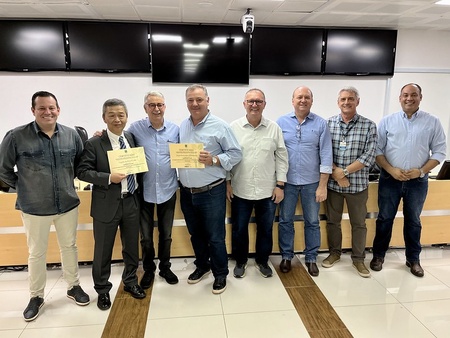
Providing solutions needed by people and the planet
The Japanese and Brazilian markets have different needs. In the automotive field, the company manufactures and sells engineering plastics that meet Japanese standards, but is currently working on the development of rice resin made from recycled rice used in biological pesticide applications.
Food packaging films are one of Toyobo's main businesses in Japan, but in Brazil, due to differences in food culture, there is still little demand for cutting-edge products such as the barrier films used in retort foods, which are common in Japan.
Meanwhile, in the rapidly growing biological pesticide business, Toyobo Brazil is independently manufacturing and expanding sales of commodity products of the quality required in the Brazilian market.
Founded by Eiichi Shibusawa in 1882, Toyobo aims to be a group that creates solutions required by people and the earth using materials and science, with the philosophy of "following reason and prosperity" (doing what needs to be done and making things prosperous). In this changing era, the company's motto of always providing materials that the world needs and developing together with the local community without being bound by its original business remains consistent in Brazil.
President Fujii, who was assigned to Brazil in March 2022 after working in six cities around the world, said, "Thanks to the hard work of Japanese people in Brazil for the past 115 years, it is a great encouragement for us to expand our business. We are also grateful to be able to employ excellent employees who understand Japanese and Brazilian culture." He said he wants to bring back to Japan the warmth of human connections that is unique to Brazil and not found in Japanese communities in other countries.
|
Toyobo Brazil Group |
*This article is reprinted from Brasil Nippou (June 3, 2023).
© 2023 Tomoko Oura


